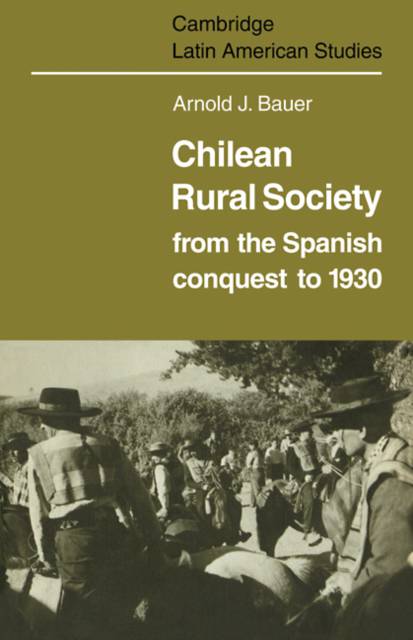
Je cadeautjes zeker op tijd in huis hebben voor de feestdagen? Kom langs in onze winkels en vind het perfecte geschenk!
- Afhalen na 1 uur in een winkel met voorraad
- Gratis thuislevering in België vanaf € 30
- Ruim aanbod met 7 miljoen producten
Je cadeautjes zeker op tijd in huis hebben voor de feestdagen? Kom langs in onze winkels en vind het perfecte geschenk!
- Afhalen na 1 uur in een winkel met voorraad
- Gratis thuislevering in België vanaf € 30
- Ruim aanbod met 7 miljoen producten
Zoeken
Omschrijving
This book attempts to place in historical perspective the evolution of Chilean rural society from its foundation in the sixteenth century to 1975 and especially to explain the unusual result of accelerated economic growth after 1860. The study is placed in the broader context of general Chilean development and the rise of the Atlantic market. Professor Bauer also points out the connections and similarities between the Chilean case and other areas peripheral to the expanding world economy. Chapters are devoted to markets, prices and credit, but the main part of the book is concerned with the social and political impact of economic expansion on rural workers and the land-owning classes. A detailed explanation of agrarian structure and the position and importance of landlord and peon within national development is essential for an understanding of modern Latin America. This book is a contribution to that understanding and people interested in other times and places will find in the experience of Chile an instructive contrast in the larger pattern on modern history.
Specificaties
Betrokkenen
- Auteur(s):
- Uitgeverij:
Inhoud
- Aantal bladzijden:
- 288
- Taal:
- Engels
- Reeks:
- Reeksnummer:
- nr. 21
Eigenschappen
- Productcode (EAN):
- 9780521101752
- Verschijningsdatum:
- 11/12/2008
- Uitvoering:
- Paperback
- Formaat:
- Trade paperback (VS)
- Afmetingen:
- 140 mm x 216 mm
- Gewicht:
- 367 g

Alleen bij Standaard Boekhandel
+ 129 punten op je klantenkaart van Standaard Boekhandel
Beoordelingen
We publiceren alleen reviews die voldoen aan de voorwaarden voor reviews. Bekijk onze voorwaarden voor reviews.









